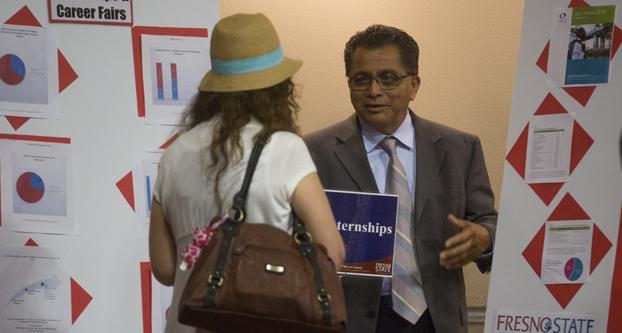They don’t wear capes or utility belts and they don’t drive batmobiles or sling webs, but over the last year several task forces have been answering student distress signals to bring more success to Fresno State.
The findings and progress of these task forces were shared at the second Student Success Summit Wednesday on campus.
“We are working to improve the day-to-day experience of students as they work toward graduation,” said Fresno State President Dr. Joseph Castro in an introduction. “Student success will be the centerpiece of our strategic plan that will be released shortly.”
Mary Sauceda, communication coordinator for student affairs and enrollment management, said the summit was intended to discuss student feedback that inspired each of the six task forces now in place.
“We are trying to get students to tell us what’s working and what’s not so we know which task forces to create,” Sauceda said.
The current task forces do not bear flashy names like the Avengers or Justice League. They do, however, fight for furthering student success. Each panel focuses on an area of villainy threatening student retention and degree completion. They are: remediation, class availability, uneven student to adviser ratios in college, student employment, the first-year college experience and future practices.
Sauceda said the task forces implement what are called “high-impact practices” that are designed to have a noticeable improvement on areas that translate to student success like engagement and graduation rates.
“A high-impact practice we are implementing now is the first-year experience,” Sauceda said. “This program helps serve the 70 percent of our incoming freshman who are first-generation college students. The experience really helps these students get acclimated to college life, which is usually a big difference from high school.”
Sauceda said Wednesday’s summit was the second in two years, and there will likely be one next year. However it is not certain if it will continue annually for long after.
“Student success will always be here, especially in student affairs,” Sauceda said. “We want to develop students wholistically, that means even outside of the classroom.”
During the summit, leaders of the student success task forces led a panel, fielding questions from students and faculty. Student success was the rallying cry of the discussion and the entire summit, but it took three visiting speakers to really define student success.
Dr. Ken O’Donnell, senior director of student engagement in the CSU Chancellor’s Office, made the point that student success goes beyond fulfilling degree requirements.
“When the state asks us to justify the soaring costs of higher education, we have to have a better story than the student stayed in their seat and graduated,” O’Donnell said.
By O’Donnell’s definition, student success is more about connecting students with their communities and themselves than pushing papers across desks. He highlighted the role of high impact practices like service-learning programs that accomplish this type of success well.
White House official Beatriz Ceja also focused on high-impact practices and their relation to student success.
“As President Obama has said, ‘There is no better policy than one that produces more graduates,’” Ceja said.
She echoed O’Donnell’s position that student success means something deeper than putting a name on a diploma or getting a student to fill a seat.
“College success goes beyond enrollment,” Ceja said. “The first step is enrollment, but then college success becomes about engagement.”
To continue the type of student success championed at the summit, Sauceda says students should get more involved.
“Task forces will grow and develop as students provide feedback,” Sauceda said. “So we are really encouraging students to go to our website and give feedback.”





